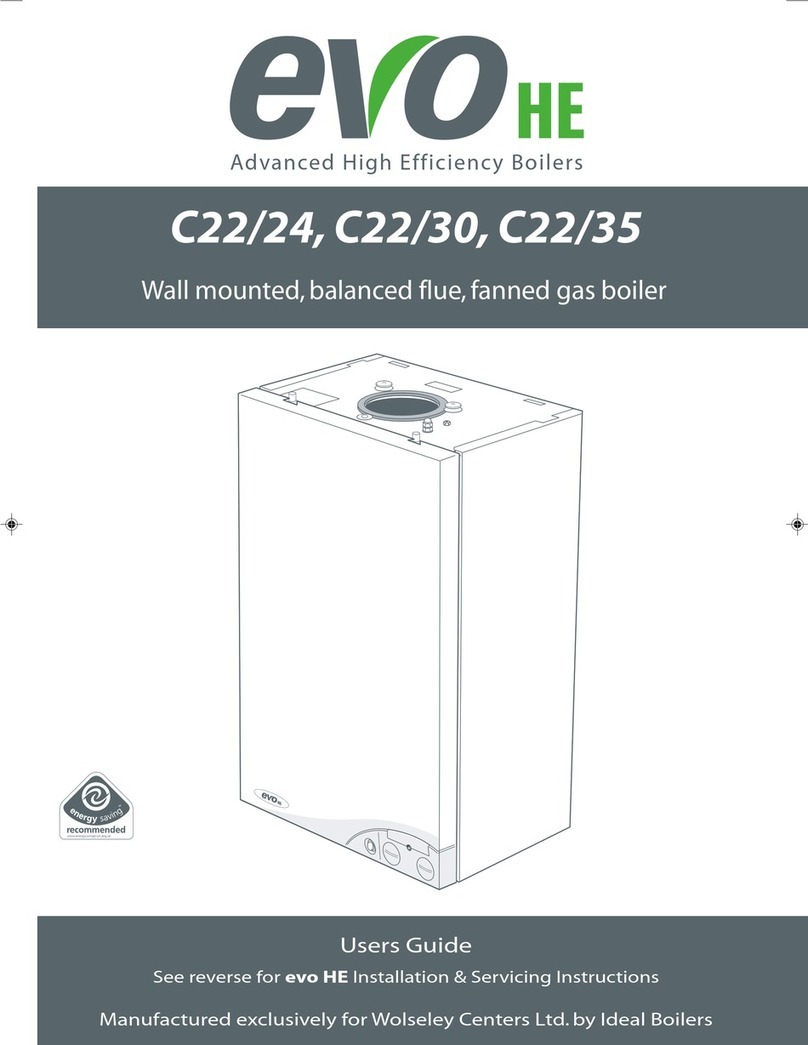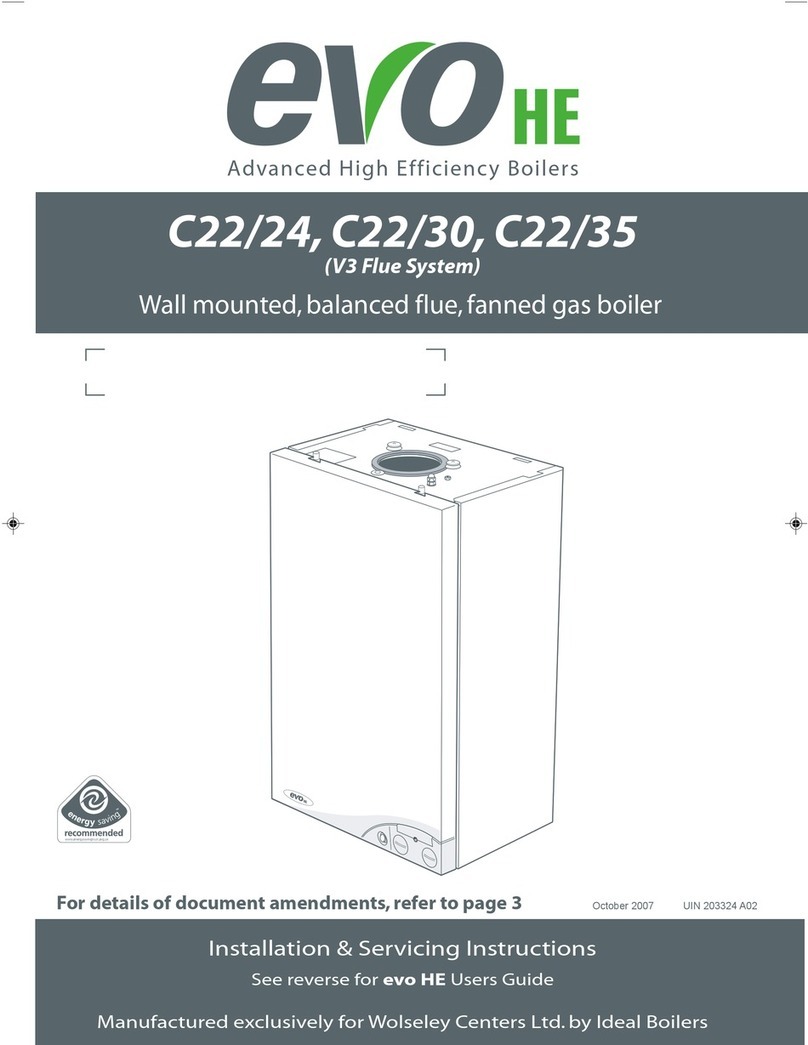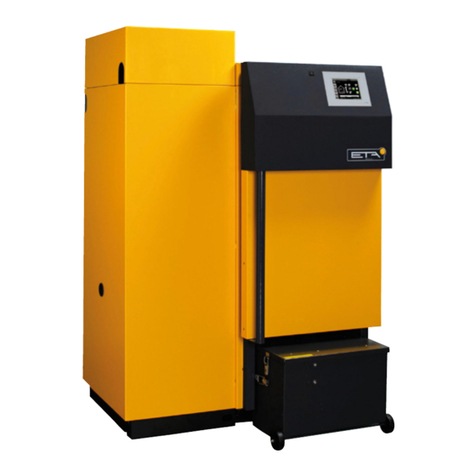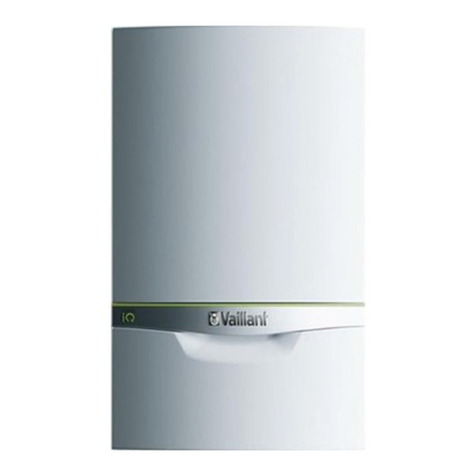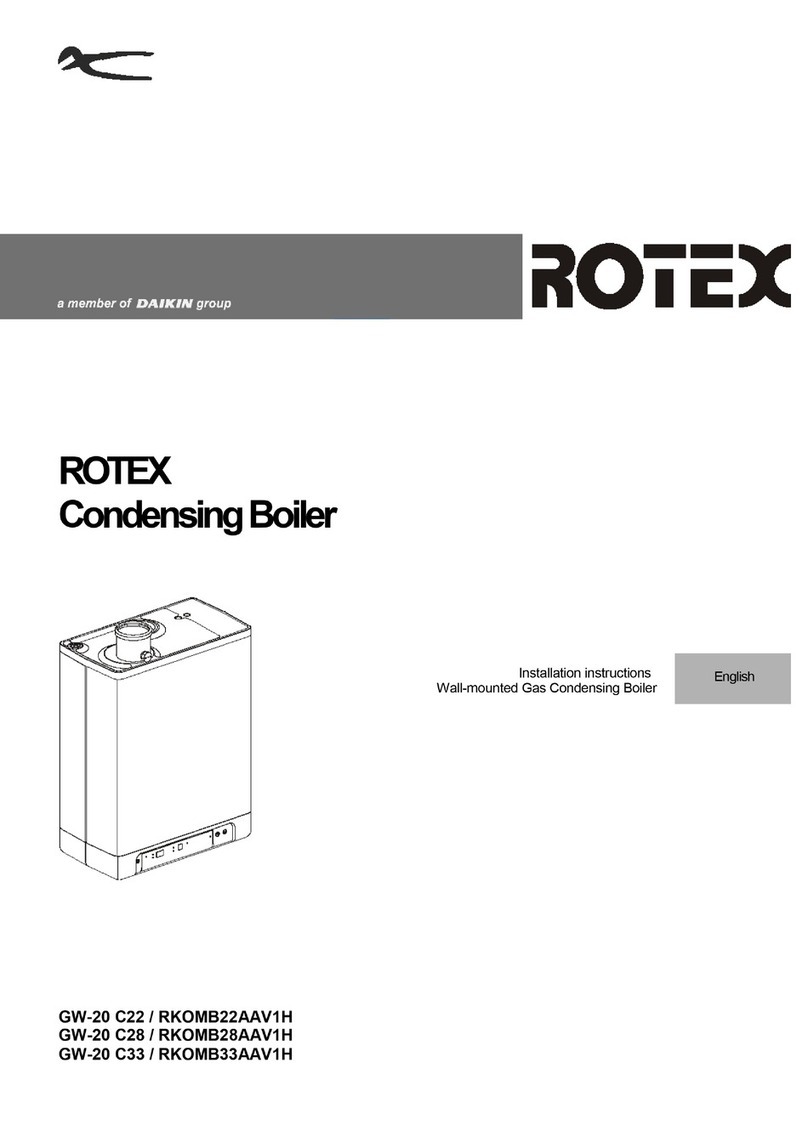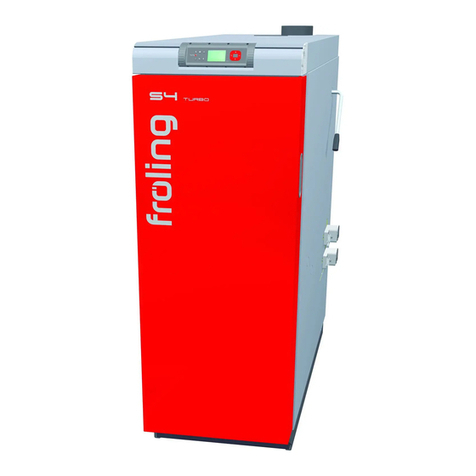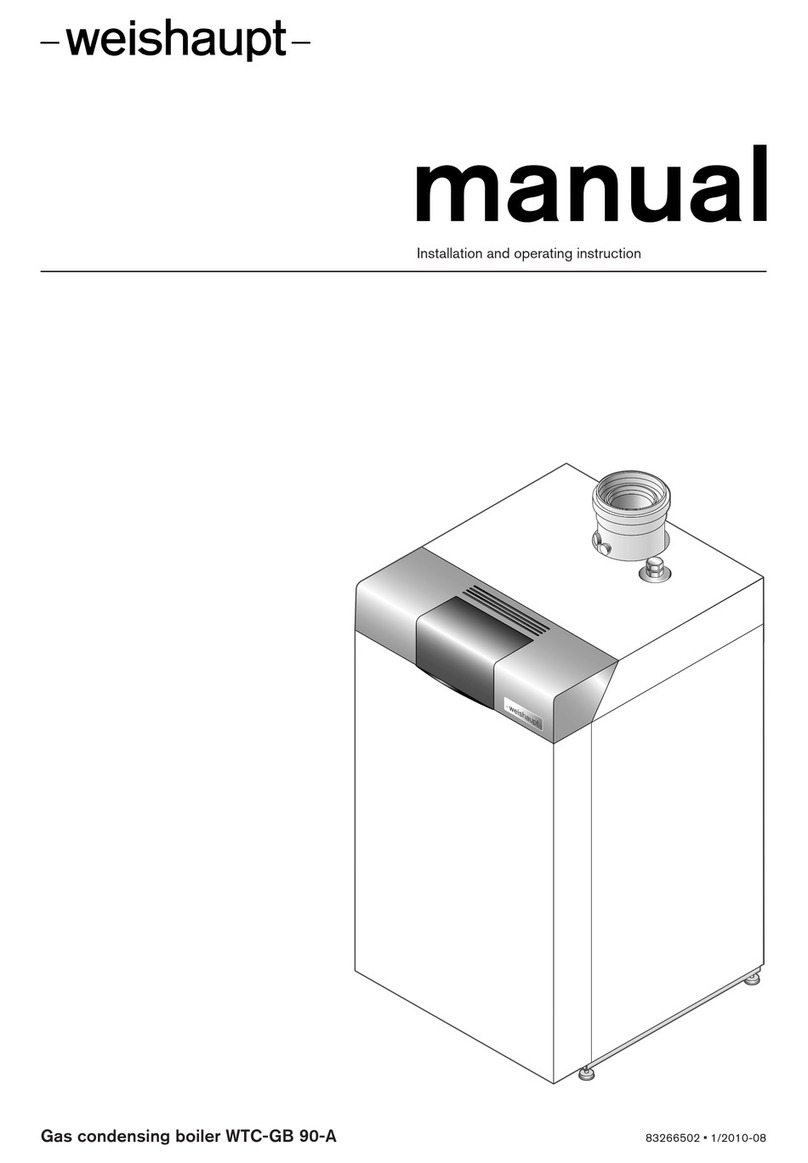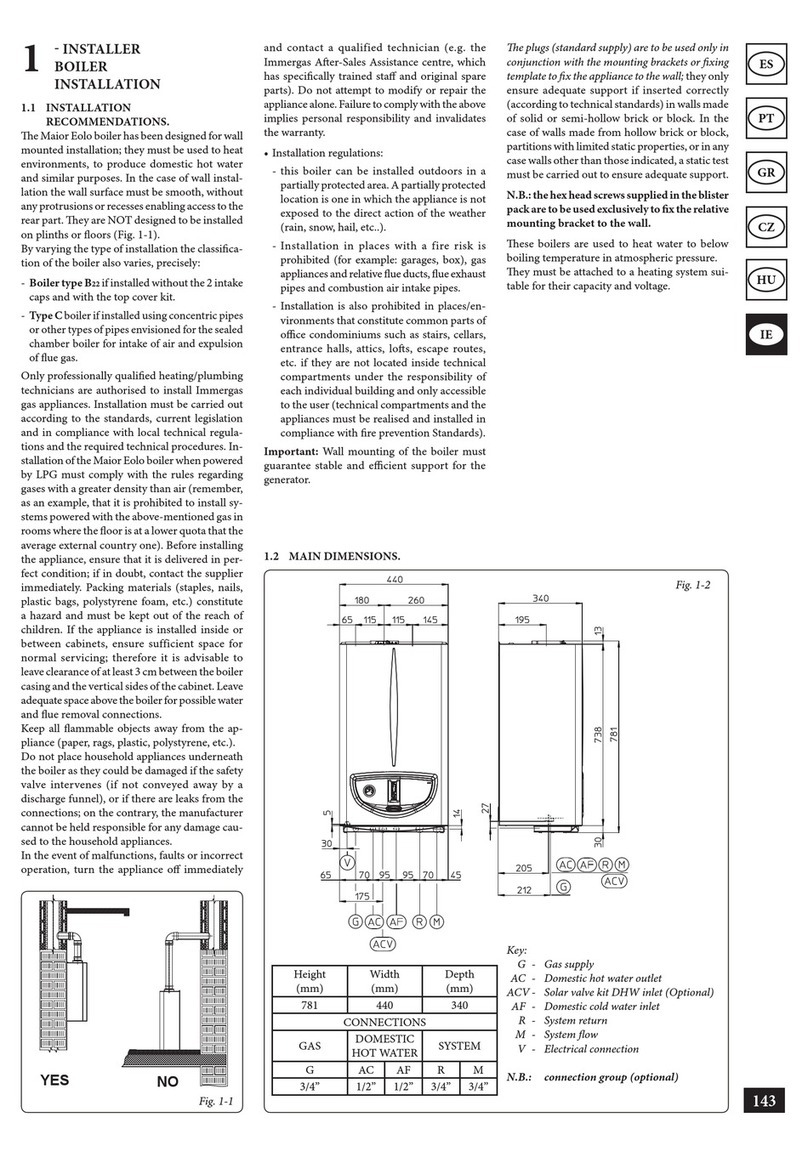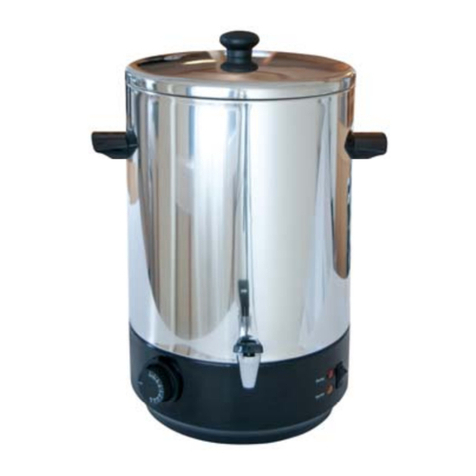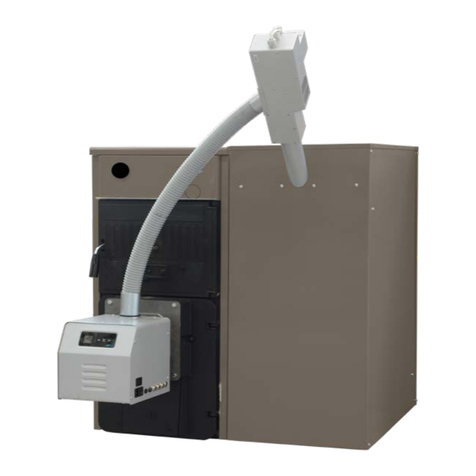Evo HE C22/24 Release note

C22/24, C22/30, C22/35
(V3 Flue System)
Wall mounted, balanced flue, fanned gas boiler
Advanced High Efficiency Boilers
Installation & Servicing Instructions
See reverse for evo HE Users Guide
Manufactured exclusively for Wolseley Centers Ltd. by Ideal Boilers
For details of document amendments, refer to page 3
September 2009 UIN 204427 A02
Packaged Boiler Contents have been
checked by Operator Number.......

2evo HE C - Installation and Servicing

3evo HE C - Installation and Servicing
DOCUMENT AMENDMENTS
Relevant Installation changes implemented in this book from Mod Level ........... A01 (July 08) to A02 (Sep 09)
Wolseley Centres Ltd. reserve the right to vary specification without notice
Page 7, Optional Extra Kits
• Addition of Concentric flue Screw Retaining Kit
Page 16, Frame 12 - Determining the Flue Lengths and Packs Required
• New flue kit added.
Page 19, Frame 16 - Terminal Wall Seal Assembly / Position
• New frame added ref. positioning of terminal wall seal
Page 22, Frame 23 - Condensate Pipe Termination Configurations
• Update drawing 1 and not added ref BS6798 (2002)
Page 49, Frame 68 - Combustion Chamber Insulation Replacement
• Updated Frame to reflect new insulation.
Page 54, Frame 78 - Diverter Valve Internal Parts Replacement
• New item no. 6 added.
Page 63, Frame 92 - H9/L9 Heat Exchanger Overheat
• New flow chart.
Page 64 - Short Parts List
• New updated parts list
Page 68 - Code of Practice
• New Code of Practice Guidelines added.

4evo HE C - Installation and Servicing
GENERAL
isar C22/24 C22/30 C22/35
Gas supply 2H - G20 - 20mbar
Gas Supply Connection 15mm copper compression
Injector Size Stereomatic 5.6mm dia. 5.7mm dia
Inlet Connection Domestic Hot Water 15mm copper compression
Outlet Connection Domestic Hot Water 15mm copper compression
Flow Connection Central Heating 22mm copper compression
Return Connection Central Heating 22mm copper compression
Flue Terminal Diameter mm (in) 100 (4)
Average Flue Temp-Mass Flow Rate (DHW) 66oC-10g/s 74oC - 12 g/s 82oC-14g/s
Maximum Working Pressure (Sealed Systems) bar (lb/in2) 2.5 (36.3)
Maximum Domestic Hot Water Inlet Pressure bar (lb/in2) 10.0 (145)
Minimum Domestic Hot Water Inlet Pressure* bar (lb/in2) 1.0 1.3 1.7**
Electrical Supply 230 V ~ 50 Hz.
Power Consumption 148 W 148 W 152 W
Fuse Rating External : 3A Internal : T3.15A L250 V
Water content Central Heating litre (gal) 2.0 (0.44)
Domestic Hot Water litre (gal) 0.5 (0.11)
Packaged Weight kg (lb) 53.3 (118) 53.4 (118) 53.6 (118)
Maximum Installation Weight kg (lb) 46.6 (103) 46.7 (103) 46.9 (103)
Boiler Casing Size Height mm (in) 687 (27)
Width mm (in) 390 (15 3/8)
Depth mm (in) 278 (11)
Table 1 - General Data
Note. Gas consumption is calculated using a
calorific value of 38.7 MJ/m3(1038 Btu/ft3) gross
or 34.9 MJ/m3 (935 Btu/ft3) nett
To obtain the gas consumption at a different
calorific value:
a. For l/s- divide the gross heat input (kW) by
the gross C.V. of the gas (MJ/m3)
b. For ft3/h - divide the gross heat input (Btu/h)
by the gross C.V. of the gas (Btu/ft3)
Key to symbols
GB = United Kingdom IE = Ireland (Countries of destination)
PMS = Maximum operating pressure of water
C13 C33 C53 = A room sealed appliance designed for connection via ducts to a
horizontal or vertical terminal, which admits fresh air to the burner
and discharges the products of combustion to the outside through
orifices which, in this case, are concentric. The fan is up stream
of the combustion chamber.
I2H = An appliance designed for use on 2nd Family gas, Group H only.
* The value is used in the UK Government's Standard Assessment Procedure (SAP) for energy rating of dwellings. The test data from which
it has been calculated have been certified by a notified body.
CAUTION.
To avoid the possibility of injury during the installation, servicing or cleaning of
this appliance care should be taken when handling edges of sheet steel components
*Required for maximum flow rate. Boiler operates down to 0.2bar with reduced DHW delivery
** In areas of low water pressure the DHW restrictor can be removed
Maximum DHW Input : C22/24 C22/30 C22/35
Nett CV kW 24.3 30.2 36.0
(Btu/h) (82 900) (103 000) (122 800)
Gross CV kW 27.0 33.5 39.9
(Btu/h) (92 100) (114 400) (136 200)
Gas Consumption l/s 0.7 0.87 1.03
(ft3/h) (89.0) (110) (131)
Maximum kW 23.4 29.3 35.2
DHW Output (Btu/h) (80 000) (100 000) (120 000)
DHW Flow Rate l/min 9.6 12.0 14.4
at 35°C temp. rise. (gpm) (2.1) 2.6 (3.2)
DHW Specific Rate l/min 11.2 14.0 16.8
(gpm) (2.5) (3.1) (3.7)
Boiler Input : Max. Min.
Boiler Input ‘Q’ Nett CV kW 22.6 9.1
(Btu/h) (77 100) (31 000)
Gross CV kW 25.1 10.1
(Btu/h) (85 600) (34 400)
Gas Consumption l/s 0.65 0.26
(ft3/h) (82.5) (33.1)
Boiler Output :
Non Condensing kW 22 8.8
70oC Mean Water temp. (Btu/h) (75 000) (30 000)
Condensing kW 23.3 9.6
40oC Mean Water temp. (Btu/h) (79 500) (32 800)
Seasonal efficiency* (SEDBUK) Band A [90.1]%
NOx Classification Class 5
Table 2 - Performance Data - Central Heating Table 3 - Performance Data - Domestic Hot Water

5evo HE C - Installation and Servicing
GENERAL
Boiler size G.C. Appliance No. PI No.
(Benchmark No.)
C22/24 47 348 32 87 BP 34
C22/30 47 348 33 87 BP 34
C22/35 47 348 34 87 BP 34
CONTENTS
Air Supply ....................................................................... 8
Benchmark Commissioning Checklist ............... 70-71
Boiler Clearances ......................................................... 9
Boiler Exploded Diagram ............................................ 13
Condensate Drain ........................................... 10, 21-23
Electrical Connections ............................................... 32
Electrical Supply ......................................................... 10
Extension Ducts - Fitting ............................................. 20
Fault Finding ........................................................... 58-63
Flow Wiring Diagram .................................................. 35
Flue Fitting .................................................................... 16
Flue Installation ............................................................. 8
Gas Safety Regulations ................................................ 7
Gas Supply ..................................................................... 8
Installation ............................................................. 12-39
Mandatory Requirements ....................................... 7-10
Pump .......................................................................... 55
Safe Handling ................................................................ 6
Servicing ................................................................ 40-57
Short List of Parts ....................................................... 64
Thermostatic Radiator Valves ................................... 10
Water and Systems ........................................... 8,10-12
Water Connections ..................................................... 29
Water Treatment ......................................................... 12
Wiring Diagrams ................................................... 32-35
evo HE
Natural Gas only
Destination Country: GB, IE
Boiler Page
Make and model ....................................................... 5
Appliance serial no. on data badge ....... Front Cover
SEDBUK No. % ......................................................... 4
Controls
Time and temperature control to heating ............. 33
Time and temperature control to hot water .......... 33
Heating zone valves .............................................. 33
TRV's ...................................................................... 10
Auto bypass ........................................................... 10
Boiler interlock ....................................................... 10
For all boilers
Flushing to BS.7593 .............................................. 12
Inhibitor .................................................................. 12
Central heating mode
Heat input ................................................to be calculated
For assistance see Technical Helpline on the back page
Page
Burner operating pressure .................................... n/a
Central heating flow temp. ...... measure and record
Central heating return temp. ... measure and record
For combination boilers only
Scale reducer ......................................................... n/a
Hot water mode
Heat input ..........................................to be calculated
Max. operating burner pressure .............................. n/a
Max. operating water pressure ........... measure & record
Cold water inlet temp ..................... measure & record
Hot water outlet temp. .................... measure & record
Water flow rate at max. setting ............ measure & record
For condensing boilers only
Condensate drain .................................................. 22
For all boilers: complete, sign & hand over to customer
For GB, to comply with Building Regulations Part L1 (Part 6 in Scotland) the boiler should be fitted in accordance with the
manufacturer's instructions. Self-certification that the boiler has been installed to comply with Building Regulations can be
demonstrated by completing and signing the Benchmark Commissioning Checklist.
Before installing this boiler, read the Code of Practice sheet at the rear of this book.
BENCHMARK COMMISSIONING CHECKLIST DETAILS
NOTE TO THE INSTALLER:
COMPLETE
THE BENCHMARK COMMISSIONING
CHECKLIST AND LEAVE THESE
INSTRUCTIONS WITH APPLIANCE

6evo HE C - Installation and Servicing
GENERAL
INTRODUCTION
The evo HE range of boilers are wall mounted, full sequence, automatic spark
ignition, low water content, fanned flue, high efficiency, condensing,
combination gas boilers.
Note.Due to the high efficiency of the boiler a plume of water vapour will form
at the terminal during operation.
Central heating (CH) output is fully modulating with a range of 8.8 to 22 kW
(30,000 to 75,000 Btu/h)
Instantaneous domestic hot water (DHW) output is also fully modulating with
a maximum of :
C22/24 23.4kW (80,000 Btu/h)
C22/30 29.3kW (100,000 Btu/h)
C22/35 35.2kW (120,000 Btu/h)
The boiler is supplied fully assembled with DHW plate heat exchanger,
diverter valve, circulating pump, pressure gauge, safety valve and CH
expansion vessel.
Variable CH and DHW temperature controls are fitted on the user control and
the boiler features a DHW preheat facility.
The boiler casing is of white painted mild steel with the user controls capable
of being mounted remotely from the boiler if the option is required.
The boiler temperature controls are visible at the bottom RHS of the front
panel.
The heat exchanger is of cast aluminium.
The boiler is suitable for connection to fully pumped, sealed water systems
ONLY. Adequate arrangements for completely draining the system by
provision of drain cocks MUST be provided in the installation pipework.
Pipework from the boiler is routed downwards as standard, but may be routed
upwards behind the boiler using the stand-off frame (supplied in a separate
kit).
OPERATION
With no demand for CH, the boiler fires only when DHW is drawn off, or
periodically for a few seconds without any DHW draw-off, in order to maintain
the DHW calorifier in a heated condition.
When there is a demand for CH, the heating system is supplied at the
selected temperature of between 30 oC and 82oC, until DHW is drawn off.
The full output from the boiler is then directed via the diverter valve to the
plate heat exchanger to supply a nominal DHW draw-off of
C22/24 9.6 l/min at 35 oC temperature rise.
C22/30 12 l/min at 35 oC temperature rise.
C22/35 14.4 l/min at 35 oC temperature rise.
The DHW draw off rate specified above is the nominal that the boiler flow
regulator will give. Due to system variations and seasonal temperature
fluctuations DHW flow rates/temperature rise will vary, requiring adjustment at
the draw off tap.
At low DHW draw-off rate the maximum temperature is limited to 65 oC by the
modulating gas control.
Refer also to Frame 1 - 'Boiler Water Circuit Diagrams'
The boiler features a comprehensive diagnostic system which gives detailed
information on the boiler status when operating, and performance of key
components to aid commissioning and fault finding.
SAFE HANDLING
This boiler may require 2 or more operatives to move it to its installation site,
remove it from its packaging base and during movement into its installation
location. Manoeuvring the boiler may include the use of a sack truck and
involve lifting, pushing and pulling.
Caution should be exercised during these operations.
Operatives should be knowledgeable in handling techniques when performing
these tasks and the following precautions should be considered:
• Grip the boiler at the base.
• Be physically capable.
• Use PPE as appropriate, e.g. gloves, safety footwear.
1
BOILER WATER
CIRCUIT DIAGRAMS
During all manoeuvres and handling actions, every
attempt should be made to ensure the following
unless unavoidable and/or the weight is light.
• Keep back straight.
• Avoid twisting at the waist.
• Avoid upper body/top heavy bending.
• Always grip with the palm of the hand.
• Use designated hand holds.
• Keep load as close to the body as possible.
• Always use assistance if required.

7evo HE C - Installation and Servicing
GENERAL
SAFETY
Current Gas Safety (installation and use) regulations or rules
in force:
The appliance is suitable only for installation in GB and IE and
should be installed in accordance with the rules in force.
In GB, the installation must be carried out by a Gas Safe
Registered Engineer. It must be carried out in accordance with
the relevant requirements of the:
• Gas Safety (Installation and Use) Regulations
• The appropriate Building Regulations either The Building
Regulations, The Building Regulations (Scotland), Building
Regulations (northern Ireland).
• The Water Fittings Regulations or Water byelaws in
Scotland.
• The Current I.E.E. Wiring Regulations.
Where no specific instructions are given, reference should be
made to the relevant British Standard Code of Practice.
In IE, the installation must be carried out by a Registered Gas
Installer (RGII) and installed in accordance with the current
edition of I.S.813 "Domestic Gas Installations", the current
Building Regulations and reference should be made to the
current ETCI rules for electrical installation.
Detailed recommendations are contained in the following British
Standard Codes of Practice:
BS. 5440:1 Flues (for gas appliances of rated input not
exceeding 70 kW).
BS. 5440:2 Ventilation (for gas appliances of rated input not
exceeding 70 kW).
BS. 5449 Forced circulation hot water systems.
BS. 5546 Installation of gas hot water supplies for
domestic purposes (2nd Family Gases)
BS. 6798 Installation of gas fired hot water boilers of rated
input not exceeding 70 kW.
BS. 6891 Low pressure installation pipes.
Health & Safety Document No. 635.
The Electricity at Work Regulations, 1989.
The manufacturer’s notes must NOT be taken, in any way, as
overriding statutory obligations.
IMPORTANT. These appliances are CE certificated for safety
and performance. It is, therefore, important that no external
control devices, e.g. flue dampers, economisers etc., are
directly connected to these appliances unless covered by these
Installation and Servicing Instructions or as otherwise
recommended by Wolseley Centers Ltd. in writing. If in doubt
please enquire.
Any direct connection of a control device not approved by
Wolseley Centers Ltd. could invalidate the certification and the
normal appliance warranty. It could also infringe the Gas Safety
Regulations and the above regulations.
SAFE HANDLING OF SUBSTANCES
Care should be taken when handling the boiler insulation panels,
which can cause irritation to the skin. No asbestos, mercury or
CFCs are included in any part of the boiler or its manufacture.
LOCATION OF BOILER
The boiler must be installed on a flat and vertical wall, capable
of adequately supporting the weight of the boiler and any
ancillary equipment.
The boiler may be fitted on a combustible wall and insulation
between the wall and the boiler is not necessary, unless
required by the local authority.
For electrical safety reasons there must be no access available
from the back of the boiler.
The boiler must not be fitted outside.
Timber Framed Buildings
If the boiler is to be fitted in a timber framed building it should be
fitted in accordance with the Institute of Gas Engineering
document IGE/UP/7:1998.
Bathroom Installations
This appliance is rated IP20.
The boiler may be installed in any room or internal space,
although particular attention is drawn to the requirements of the
current IEE (BS.7671) Wiring Regulations and, in Scotland, the
electrical provisions of the building regulations applicable in
Scotland, with respect to the installation of the boiler in a room
or internal space containing a bath or shower. For IE reference
should be made to the current ETCI rules for electrical
installations and I.S. 813:2002.
If the appliance is to be installed in a room containing a bath or
shower then, providing water jets are not going to be used for
cleaning purposes (as in communal baths/showers), the
appliance must be installed in Zone 2, as detailed in BS.7671.
Compartment Installations
A compartment used to enclose the boiler should be designed
and constructed specially for this purpose.
An existing cupboard or compartment may be used, provided
that it is modified for the purpose.
In both cases, details of essential features of cupboard /
compartment design, including airing cupboard installation, are
to conform to the following:
zBS 6798 (No cupboard ventilation is required - see ‘Air
Supply’ for details).
zThe position selected for installation MUST allow adequate
space for servicing in front of the boiler.
zFor the minimum clearances required for safety and
subsequent service, see the wall mounting template and
Frame 2. In addition, sufficient space may be required to
allow lifting access to the wall mounting plate.
OPTIONAL EXTRA KITS
• Flue Extension Ducts (1000mm long).
C22/24 & 30-up to 6m
C22/35-up to 3m
• Flue Finishing Kit
•90
oElbow Kit (maximum per installation).
C22/24 & 30-up to 4 elbows
C22/35-up to 2 elbows
•45
oElbow Kit (maximum per installation).
C22/24 & 30-up to 4 elbows
C22/35-up to 2 elbows
• Concentric Flue Screw Retaining Kit
• Roof Flue Kit (to a maximum of 7.5m).
• Powered Vertical Flue Kit (5m primary and 17m secondary
is a typical maximum length. For alternative details refer to
Powered Vertical Instructions).
• High Level Flue Outlet Kits
• Flue Deflector Kit
• Weather Collar
• Horizontal Flue Terminal 600mm long
• Remote User Controls Kit
• Boiler Stand-off Kit
• Siphon Kit
• Valve Cover Kit
• Condensate Pump Kit
• Pre-piping Frame
• Adjustable flue support bracket

8evo HE C - Installation and Servicing
GENERAL
GAS SUPPLY
The local gas supplier should be consulted, at the installation
planning stage, in order to establish the availability of an
adequate supply of gas. An existing service pipe must NOT be
used without prior consultation with the local gas supplier.
The boiler MUST be installed on a gas supply with a governed
meter only.
A gas meter can only be connected by the local gas supplier or
by a Gas Safe Registered Engineer. In IE by a Registered Gas
Installer (RGII).
An existing meter should be checked, preferably by the gas
supplier, to ensure that the meter is adequate to deal with the
rate of gas supply required.
It is the responsibility of the Gas Installer to size the gas
installation pipework in accordance with BS6891:2005. Whilst
the principle of the 1:1 gas valve ensures the evo C range is
able to deliver it’s full output at inlet pressures as low as 14mb,
other gas appliances in the property may not be as tolerant.
When operating pressures are found to be below the minimum
meter outlet of 19mb these should be checked to ensure this is
adequate for correct and safe operation.
Allowing for the acceptable pressure loss of 1mb across the
installation pipework, it can be assumed that a minimum
permitted operating pressure of 18mb will be delivered to the
inlet of the appliance. (Reference BS 6400-1 Clause 6.2
Pressure Absorption).
The integral appliance isolation valve and boiler pipework
could further reduce the operating pressure by up to 1.5mb
when measured at the inlet test point on the appliance gas
valve. Therefore it has been identified that an operating
pressure as low as 16.5mbar could be measured at the
appliance inlet pressure test point on the gas valve.
IMPORTANT.
Installation pipes must be fitted in accordance with BS.6891. In
IE refer to IS.813:2002. Pipework from the meter to the boiler
MUST be of an adequate size.
The complete installation MUST be tested for gas tightness and
purged as described in the above code.
FLUE INSTALLATION
Pluming will occur at the terminal so terminal positions where
this could cause a nuisance should be avoided.
The flue must be installed in accordance with the
recommendations of BS. 5440-1: 2000.
In IE refer to I.S. 813:2002.
The following notes are intended for general guidance:
1. The boiler MUST be installed so that the terminal is exposed
to external air.
2. It is important that the position of the terminal allows the free
passage of air across it at all times.
3. Minimum acceptable spacing from the terminal to
obstructions and ventilation openings are specified in
Table 4.
4. Where the lowest part of the terminal is fitted less than 2m
(6'6") above a balcony, above ground or above a flat roof to
which people have access then the terminal MUST be
protected by a purpose designed guard.
Terminal guards are available from boiler suppliers. (Ask for
TFC flue guard model no. K6 - round, plastic coated). In case
of difficulty contact:
Grasslin (UK) Ltd. Tel. + 44 (0) 01732 359 888
Tower House, Vale Rise Fax. + 44 (0) 01732 354 445
Tonbridge. Kent TN9 1TB www.tfc-group.co.uk
Ensure that the guard is fitted centrally.
5. The flue assembly shall be so placed or shielded as to
prevent ignition or damage to any part of any building.
6. The air inlet/products outlet duct and the terminal of the boiler
MUST NOT be closer than 25mm (1") to combustible
material. Detailed recommendations on the protection of
combustible material are given in BS. 5440-1:2000.
IMPORTANT. It is absolutely essential to ensure, in practice,
that products of combustion discharging from the terminal
cannot re-enter the building or any other adjacent building
through ventilators, windows, doors, other sources of natural air
infiltration, or forced ventilation / air conditioning.
If this should occur the appliance MUST be turned OFF, labelled
as 'unsafe' until corrective action can be taken.
TERMINAL
The terminal assembly can be adapted to accommodate various
wall thicknesses. Refer to Frame 12 .
AIR SUPPLY
It is NOT necessary to have a purpose-provided air vent in the
room or internal space in which the boiler is installed. Neither is
it necessary to ventilate a cupboard or compartment in which
the boiler is installed, due to the low surface temperatures of
the boiler casing during operation; therefore the requirements of
BS 6798, Clause 12, and BS 5440:2 may be disregarded.
WATER CIRCULATION SYSTEM
IMPORTANT.
A minimum length of 1 metre of copper pipe MUST be fitted to
both flow and return connections from the boiler before
connection to any plastic piping.
The central heating system should be in accordance with
BS.6798 and, in addition, for smallbore and microbore
systems, BS.5449.
WATER TREATMENT - see Frame 6
* Only one reduction down to 25mm is allowable per installation
otherwise BS5440-1 2000 dimensions must be followed.
Flue Terminal Positions
Min. Spacing*
1. Directly below, above or alongside an opening
window, air vent or other ventilation opening. 300mm (12")
2. Below guttering, drain pipes or soil pipes. 25mm ( 1")*
BS5440-1 2000 75mm (3")
3. Below eaves. 25mm (1")*
BS5440-1 2000 200mm (8")
4. Below balconies or a car port roof. 25mm (1")*
BS5440-1 2000 200mm (8")
5. From vertical drain pipes or soil pipes. 25mm (1")*
BS5440-1 2000 150mm (6")
6. From an internal or external corner or to a 25mm (1")*
boundary along side the terminal. BS5440-1 2000 300mm (12")
7. Above adjacent ground, roof or balcony level. 300mm (12")
8. From a surface or a boundary facing the terminal. 600mm (24")
9. From a terminal facing a terminal. 1,200mm (48")
10. From an opening in a car port
(e.g. door or window) into dwelling. 1,200mm (48")
11. Vertically from a terminal on the same wall. 1,500mm (60")
12. Horizontally from a terminal on the wall. 300mm (12")
Vertical Terminals
13. Above the roof pitch with roof slope of all angles. 300mm (12")
Above flat roof. 300mm (12")
14. From a single wall face. 300mm (12")
From corner walls. 300mm (12")
Table 4 - Balanced Flue Terminal Position

9evo HE C - Installation and Servicing
GENERAL
60 65 55 79 65
95
evfu9802
2
BOILER DIMENSIONS, SERVICES & CLEARANCES all dimensions in mm (in)
The boiler connections are made on the boiler connection tails.
Refer to Frames 32-35.
The following minimum clearances must be maintained for
operation and servicing.
Additional space will be required for installation, depending
upon site conditions.
Side and Rear Flue
a. Provided that the flue hole is cut accurately, e.g. with a
core drill, the flue can be installed from inside the building
where wall thicknesses do not exceed 600mm (24"). Where
Front clearance
The minimum front clearance when built in to a cupboard is 5mm (1/
4") from the cupboard door but 450mm (17 3/4") overall clearance is
still required, with the cupboard door open, to allow for servicing.
N.B. The boiler will not fit into a standard depth wall unit. In order for
it to do so the plastic fascia should be removed. See Frame 44.
*Bottom clearance
Bottom clearance after installation can be reduced to 5mm.
However, 100mm must be available for servicing.
the space into which the boiler is going to be installed is
less than the length of flue required the flue must be fitted
from the outside.
Installation from inside ONLY
b. If a core boring tool is to be used inside the building the
space in which the boiler is to be installed must be at least
wide enough to accommodate the tool.
REAR FLUE ONLY
MIN. Top clearance required = 145 mm (5 3/4")
SIDE FLUE ONLY
Horizontal length of flue Top clearance
from centre line of boiler required (MIN.)
to outside wall Dim. A
C22/24 C22/30 C22/35
0.5 m 0.5 m 0.5 m 160 mm (6 5/16")
1.0 m 1.0 m 1.0 m 170 mm (6 11/16)
1.5 m 1.5 m 1.5 m 185 mm (7 1/4")
1.5 m 1.5 m 1.5 m 200 mm ( 7 7/8")
2.5 m 2.5 m 2.5 m 210 mm (8 1/4")
3.0 m 3.0 m 3.0 m 225 mm (8 7/8")
3.5 m 3.5 m N/A 250 mm (9 7/8")
4.0 m 4.0 m N/A 260 mm (10 1/4")
4.5 m 4.5 m N/A 265 mm (10 7/16")
5.0 m 5.0 m N/A 275 mm (10 13/16")
5.5 m 5.5 m N/A 290 mm (11 3/8")
6.0 m 6.0 m N/A 300 mm (11 13/16")

10 evo HE C - Installation and Servicing
GENERAL
General
1. The installation must comply with all relevant national and
local regulations.
2. The installation should be designed to work with flow
temperatures of up to 82 oC.
3. All components of the system must be suitable for a working
pressure of 3 bar and temperature of 110 oC. Extra care
should be taken in making all connections so that the risk of
leakage is minimised.
The following components are incorporated within the
appliance:
a. Circulating pump.
b. Safety valve, with a non-adjustable preset lift pressure of
3 bar.
c. Pressure gauge, covering a range of 0 to 6 bar.
d. An 8-litre expansion vessel, with an initial charge pressure
of 0.75 bar.
4. 'Make-up' Water. Provision must be made for replacing water
loss from the system, either :
a. From a manually filled 'make-up' vessel with a readily
visible water level. The vessel should be mounted at
least 150mm above the highest point of the system and
be connected through a non-return valve to the system,
fitted at least 150mm below the 'make-up' vessel on the
return side of the radiators.
Notes
a. The method of filling, refilling, topping up or flushing sealed
primary hot water circuits from the mains via a temporary hose
connection is only allowed if acceptable to the local water
authority.
b. Antifreeze fluid, corrosion and scale inhibitor fluids suitable
for use with boilers having aluminium heat exchangers may
be used in the central heating system.
Advice should be sought from a local water treatment company.
BOILER CONTROL INTERLOCKS
Wolseley Centres Ltd. recommend that heating systems
utilising full thermostatic radiator valve control of
temperature in individual rooms should also be fitted with a
room thermostat controlling the temperature in a space
served by radiators not fitted with such a valve as stated in
BS. 5449.
Central heating systems controls should be installed to
ensure the boiler is switched off when there is no demand
for heating or hot water.
When thermostatic radiator valves are used, the space
heating temperature control over a living / dining area or
hallway having a heating requirement of at least 10% of the
boiler heat output should be achieved using a room
thermostat, whilst other rooms are individually controlled by
thermostatic radiator valves. However, if the system
employs thermostatic radiator valves on all radiators, or two
port valves, then a bypass circuit must be fitted with an
automatic bypass valve to ensure a flow of water should
all valves be in the closed position.
ELECTRICAL SUPPLY
WARNING.
This appliance must be earthed.
Wiring external to the appliance MUST be in accordance with the
current I.E.E. (BS.7671) Wiring Regulations and any local
regulations which apply. For IE reference should be made to the
current ETCI rules for electrical installations.
The point of connection to the mains should be readily accessible
and adjacent to the boiler.
Note. The fan voltage is 325V DC
CONDENSATE DRAIN Refer to Frames 22 & 54.
A condensate drain is provided on the boiler. This drain must be
connected to a drainage point on site. All pipework and fittings in the
condensate drainage system MUST be made of plastic - no other
materials may be used.
IMPORTANT.
Any external runs must be insulated
The drain outlet on the boiler is standard 21.5mm (3/4”) overflow pipe.
3
SYSTEM REQUIREMENTS - Central Heating
Safety valve setting bar 3.0
Vessel charge pressure bar 0.5 to 0.75
System pre-charge pressure bar None 1.0
System volume Expansion vessel
(litres) volume (litres)
25 1.6 1.8
50 3.1 3.7
75 4.7 5.5
100 6.3 7.4
125 7.8 9.2
150 9.4 11.0
175 10.9 12.9
190 11.9 14.0
200 12.5 14.7
250 15.6 18.4
300 18.8 22.1
For other system volumes
multiply by the factor across 0.063 0.074
or
b. Where access to a 'make-up' vessel would be difficult,
by pre-pressurisation of the system.
The maximum cold water capacity of the system
should not exceed 143 litres, if not pressurized.
However, if the system is to be pressurized, the
efficiency of the expansion vessel will be reduced and
a larger vessel (or smaller system volume) may be
necessary. If the capacity of the vessel is not
considered sufficient for this, or for any other reason,

11evo HE C - Installation and Servicing
GENERAL
4
SYSTEM REQUIREMENTS - CH (continued) and Hot Water
an additional vessel MUST be installed on the return to
the boiler.
Guidance on vessel sizing is given in Frame 3.
5. Filling. The system may be filled by the following method:
a. Through a temporary hose connection from a 'draw-off'
tap, supplied from a service pipe under mains pressure.
Where the mains pressure is excessive a pressure
reducing valve must be used to facilitate filling.
When installing the filling device it must be connected as
shown below, to fully comply with the water regulations.
This may involve the fitting of an additional WRAS
approved isolator valve to the mains supply.
i. Thoroughly flush out the whole system with
cold water.
ii. Fill and vent the system until the pressure
gauge registers 1bar and examine for leaks.
iii. Release water from the system until the
minimum system design pressure is reached;
1.0 bar if the system is to be pre-pressurised.
Water Flow Rate and Pressure Loss
Max CH Output kW 23.4
(Btu/h) (80 000)
Water flow rate l/sec 0.37
(gal/min) 4.8
Temperature Differential oC15
(oF) (27)
Head available for m.w.g. 2.3
system pump. (ft.w.g.) 7.5
DOMESTIC HOT WATER
1. The domestic hot water service must be in accordance with
BS 5546 and BS 6700.
2. Refer to Table 1 for minimum and maximum working
pressures.
3. The boilers are suitable for connection to most types of
washing machine and dishwasher appliances.
4. When connecting to suitable showers, ensure that:
a. The cold inlet to the boiler is fitted with an approved
anti-vacuum or syphon non-return valve.
b. Hot and cold water supplies to the shower are of equal
pressure.
CH Return
Ecl 6053
Hose unions
Mains
water supply
Temporary hose
(disconnect after filling)
Additional
stop valve
Double check valve
assembly
(note direction of flow)
The boiler does not normally need a bypass but at least some
radiators on the heating circuit, of load of at least 10% of the
minimum boiler output, must be provided with twin lockshield
valves so that this minimum heating load is always available.
See note regarding thermostatic radiator valves on page 10.
Note. Systems incorporating zone valves which could
completely cut off the flow through the system must also
include a bypass.
BALANCING
1. Set the programmer to ON.
Close the manual or thermostatic valves on all radiators,
leaving the twin lockshield valves (on the radiators referred
to above) in the OPEN position.
5
SYSTEM BALANCING
Turn up the room thermostat and adjust these lockshield
valves to give boiler flow and return temperatures not
more than 20 oC differential.
These valves should now be left as set.
2. Open all manual or thermostatic radiator valves and
adjust the lockshield valves on the remaining radiators,
to give around 15 oC temperature drop at each radiator.
3. Adjust the room thermostat and programmer to
NORMAL settings.
5. Hard Water Areas
Where the water hardness exceeds 200mg/litre, it is
recommended that a proprietary scale reducing device is
fitted into the boiler cold supply within the requirements of
the local water company.
IMPORTANT
Provision MUST be made to accommodate the expansion of
DHW contained within the appliance, if a non-return valve is
fitted to the DHW inlet.

12
INSTALLATION
evo HE C - Installation and Servicing
6
WATER TREATMENT
CENTRAL HEATING
The evo HE range of boilers have an ALUMINIUM alloy
heat exchanger.
IMPORTANT.
The application of any other treatment to this product
may render invalid the guarantee of Wolseley Centres
Ltd.
Wolseley Centres Ltd. recommend Water Treatment in
accordance with the Benchmark Guidance Notes on
Water Treatment in Central Heating Systems.
If water treatment is used Wolseley Centres Ltd.
recommend only the use of FERNOX-COPAL, MB1, GE BETZ or
SENTINEL X100 inhibitors and associated water treatment
products, which must be used in accordance with the
manufacturers' instructions.
Notes.
1. It is most important that the correct concentration of the
water treatment products is maintained in accordance with
the manufacturers' instructions.
2. If the boiler is installed in an existing system any unsuitable
additives MUST be removed by thorough cleansing. BS
7593:2006 details the steps necessary to clean a domestic
heating system.
3. In hard water areas, treatment to prevent lime scale may be
necessary - however the use of artificially softened water is
NOT permitted.
4. Under no circumstances should the boiler be fired before
the system has been thoroughly flushed.
DOMESTIC HOT WATER
In hard water areas where main water can exceed 200ppm
Total Hardness (as defined by BS 7593:2006 Table 2) a
scale reducing device should be fitted into the boiler cold
supply within the requirements of the local water company.
The use of artificially softened water, however, is not
permitted.
Wolseley Centres Ltd. recommend the use of Fernox
Qantomat, GE Betz Sentinel Combiguard and Calmag
CalPhos I scale reducing devices, which must be used in
accordance with the manufacturers' instructions.
19. Gas control valve.
20. Fan bracket.
21. Orifice plate.
23. Control thermistor (flow/return)
24. Overheat thermostat.
25. Ignition electrode.
26. Flame detection electrode.
32. Kit - Trap and seal.
35. User control.
36. Primary controls (PCB).
39. Mains switch.
40. Spark generator.
44. Wall mounting plate
51. Mains connector.
53. Turret gasket kit.
57. CH stub pipe.
1. Front casing panel.
2. Boiler sealing panel.
3. Sump cover.
4. Bottom casing panel.
5. Flue sensing nipple.
6. Return pipe.
8. Flue manifold.
10. Interpanel.
11. Burner.
12. Combustion chamber insulation.
13. Heat exchanger.
14. Injector and housing.
15. Venturi assembly.
16. Fan assembly.
17. Automatic air vent (Heat Exchanger)
18. Gas service cock.
7
BOILER ASSEMBLY - Exploded View Legend
59. Flow restrictor.
60. DHW inlet/outlet pipe.
61. Pressure relief valve.
62. Expansion vessel.
64. Pressure gauge.
66. Diverter valve head.
67. Diverter valve.
68. Diverter valve manifold.
69. Pump
70. Pump manifold.
71. DHW plate heat exchanger.
75. Control box clamp.
94. Ignition lead.
98. Air Vent (Pump)
103. Dry fire thermistor.
For further information contact:
Fernox Manufacturing Co. Ltd
Cookson Electronics
Forsyth Road
Sheerwater
Woking
Surrey GU21 5RZ
+44 (0) 1799 521133
Sentinel Performance Solutions
The Heath Business & Technical Park
Runcorn
Cheshire WA7 4QX
Tel: 0800 389 4670
www.sentinel-solutions.net
Salamander Engineering Ltd
The Heath Business & Technical Park
Runcorn
Cheshire WA7 4QX
Tel: 0800 389 4670
Calmag Ltd.
Unit 4-6, Crown Works
Bradford Road
Sandbeds, Keighley
West Yorkshire BD20 5LN
Tel: +44 (0) 1535 210 320
Note that item numbers are linked to the spares list

13
INSTALLATION
evo HE C - Installation and Servicing
8
BOILER ASSEMBLY - Exploded View
62
44
5
4
10
25
17
103
8
11
26
12
13
3
23
32
19
36
39
35
24
71
98
69
74
57
60
18
60
68
67
66 6
51
64
57
75
59
61
40
94
53
14
15
21
16
20
2
1
evfu9803
INSTALLATION

14
INSTALLATION
evo HE C - Installation and Servicing
isfu8751d
D
C
BA
E
evfu9804
B
CE
A
D
F
9
UNPACKING
The boiler is supplied fully assembled in one Pack A, together with a telescopic flue
assembly for lengths up to 595mm, rear or side flue outlet, in Pack B.
Unpack and check the contents.
Pack A Contents
A Boiler
B Hardware Pack Box
C Wall Mounting Plate
D These Installation/Users
Instructions
E Wall Mounting Template
(located on internal
protective packaging)
F 1 Year Guarantee
Pack B Contents
A Telescopic flue terminal
B Flue turret
C Rubber Terminal Wall Seal
D Screw
E Sealing tape
Hardware Pack Contents
A Support Bracket - 1 off
B Accessory Pack
C CH Flow Valve & Gauge Pack
D DHW Pack
E Gas Valve Pack
F CH Return Valve Pack
G “S” Trap Hose Moulding
INSTALLATION

15
INSTALLATION
evo HE C - Installation and Servicing
1. Ensure the boiler is on a sound flat
surface.
2. Carefully remove the strapping.
3. Fold back the top flaps to gain access to:
zInstructions
z1 year guarantee
zWall mounting plate
zWall mounting template.
(located under pre-piping frame on
protective packaging).
4. Remove the instructions and read
thoroughly before unpacking the product.
5. When ready for installation lift off the
cardboard carton.
10
PACKAGING REMOVAL
11
BOTTOM AND FRONT PANEL REMOVAL
1. Remove the screw from the
underside of the boiler’s bottom
panel.
2. Pull the right-hand side of the panel
down, slide it to the right and
withdraw.
3. Remove the screws from bottom of
the front panel.
4. Lift panel up and off top pegs.
Boiler
Hardware
pack box
Wall Mounting template/
protective packaging
evfu9805
2
1
3
evfu9806
INSTALLATION

16
INSTALLATION
evo HE C - Installation and Servicing
FLUE OUTLET
IMPORTANT. The boiler MUST be installed in a vertical position
Dimension X - Wall thickness.
Dimension L - Wall thickness plus boiler spacing.
Dimension S - Stand-off frame depth = 33mm
12
DETERMINING THE FLUE LENGTH AND FLUE PACKS REQUIRED
Note. MAXIMUM FLUE LENGTHS:
C22/24 & C22/30 - 6M (HORIZONTAL FLUE)
C22/35 - 3M (HORIZONTAL FLUE)
C22/24, C22/30 & C22/35 - 7.5M (ROOF FLUE)
C22/24, C22/30 & C22/35 - 5M PRIMARY AND 17M SECONDARY IS A TYPICAL MAX.
FLUE LENGTH. (For alternative details refer to Powered
Vertical Instructions)
90OELBOW KIT 60/100 (EQUIVALENT FLUE LENGTH RESISTANCE = 1M)
45OELBOW KIT 60/100 (EQUIVALENT FLUE LENGTH RESISTANCE = 0.6M)
MINIMUM HORIZONTAL FLUE LENGTHS - TELESCOPIC TERMINAL = 370MM
(Centre Line of turret to outside of wall terminal) - ONE PIECE TERMINAL = 285MM
Wall Thickness X
160 mm
160 + S = 193mm
nm8943
FLUE KITS
Pack B - supplied as standard
Pack D - optional extension kit for side flue or rear flue outlet.
Screw Kit - Optional kit for mechanical fixing of flue joints
Finishing Kit - Supplied as an optional extra.
Refer to 'Flue Extension Ducts'
195mm
195mm
Wall Thickness X
Side flue length L
SIDE FLUE REAR FLUE

17
INSTALLATION
evo HE C - Installation and Servicing
FLUE OUTLET
Notes.
1. It is recommended that a support bracket is
fitted for every 1 meter of extension pipe used
and a bracket should be used at every joint,
to ensure pipes are held at the correct angle.
If a slip joint coupling is to be used then a
bracket should be used to secure the collar.
2. When extension ‘D’ packs are used the flue
duct MUST be inclined at 1.5 degrees to the
horizontal to allow condensate to drain back
into the boiler and out through the
condensate drain.
3. If the telescopic ‘B’ pack, or horizontal flue
terminal (600 long) only are used, they may
be mounted horizontally. The 1.5 degrees is
taken care of by the inclination of the flue
within the air pipe.
4. If the boiler is to be installed with upward
piping routed behind the boiler then the
optional stand-off kit should be used. Care
must be taken when cutting the ducts and
marking the wall to suit this condition.
5. Only use water as a lubricant during
assembly. Do not use mineral based oils.
Total Flue length dimension Flue
(measuring from CL of turret to outside wall)
Rear flue Side flue Extra packs Boiler
dim. X+160 dim. L+195 required Size
Up to 595 mm Up to 595 mm none C22/24,30 & 35
Up to 1545 mm Up to 1545 mm Pack D - 1 off C22/24,30 & 35
Up to 2495 mm Up to 2495 mm Pack D - 2 off C22/24,30 & 35
Up to 3445 mm Up to 3445 mm Pack D - 3 off C22/24,30 & 35*
Up to 4395 mm Up to 4395 mm Pack D - 4 off C22/24 & 30
Up to 5345 mm Up to 5345 mm Pack D - 5 off C22/24 & 30
Up to 6000 mm Up to 6000 mm Pack D - 6 off C22/24 & 30
*evo HE C22/35 is capable of 3m flue only
12A
CONT’D DETERMINING THE FLUE LENGTH AND FLUE PACKS REQUIRED
1
nm8760
13
FLUE ASSEMBLY - Exploded View
An optional flue duct extension kit is
required for wall thicknesses greater
than :
Side 395mm
Rear 435mm
Rear flue arrangement shown
LEGEND
1. Duct assembly.
2. Flue turret.
3. Turret gasket.
4. M5 x 10 pozi screw.
5. Turret clamp.
The flue terminal MUST be
fitted with the ‘TOP’
uppermost to allow the
correct fit and use of the
plume management system.
TOP

18
INSTALLATION
evo HE C - Installation and Servicing
FLUE OUTLET
The wall mounting template is located on the internal
protective packaging.
Note.
The template shows the positions of the fixing holes and
the rear flue hole centre for standard installation. Care
MUST be taken to ensure the correct holes are drilled.
1. Tape template into the selected position. Ensure
squareness by hanging a plumbline as shown.
2. If fitting a side flue extend the flue centre line onto the side
wall and measure in 155mm for standard installation.
Note. If using stand-off kit distance increases to 188mm.
3. Mark onto the wall the following:
aThe wall mounting plate screw positions (choose one
from each group).
b. The position of the flue duct hole (see diagram below).
Note. Mark the centre of the hole as well as the
circumference.
4. Remove the template from the wall.
14
WALL MOUNTING TEMPLATE
nm9279
V - See Diagram Below
Extended centre line
155
nm8772
C22/35
C22/24 & C22/30
15
PREPARING THE WALL
IMPORTANT.
Ensure that, during the cutting operation, masonry
falling outside of the building does not cause damage
or personal injury.
1. Cut the flue hole (preferably with a 5" core boring
tool), ensuring that the hole is square to the wall.
Both wall faces immediately around the cut hole
should be flat.
2. Drill 4 holes with a 7.5mm / 8mm masonry drill
and insert the plastic plugs, provided, for the
piping frame.
3. Locate 4 No.14 x 50mm screws in the piping
frame (one at each side, in any of the 3 holes
provided at each side) and screw home.
2011
X
Section
through wall
Note. Check all of the hole
positions before drilling.
Side flue only
5" diameter hole
Rear flue only
5" diameter hole

19
INSTALLATION
evo HE C - Installation and Servicing
FLUE OUTLET
16
TERMINAL WALL SEAL ASSEMBLY / POSITIONING
Ensure lipof wall seal ispositioned
over step on plasticnose of flue terminal
(note, sealis cutaway for clarity)
Step
isfu9783
Wall Seal Lip
Prior to fitting the flue, the rubber terminal wall seal provided
in the flue pack MUST be fitted to the flue terminal as shown
below in Figure 1.
FIGURE 1 FIGURE 2
Once the flue is installed it is IMPORTANT that the rubber
terminal wall seal is pressed against the outside wall to
create an adequate seal between the flue and wall as
shown in Figure 2.
var9784
Rubber
Terminal
Wall Seal
17B
SETTING THE FLUE - SIDE Wall thicknesses of 170 to 395mm
17A
SETTING THE FLUE - REAR Wall thicknesses of 210 to 435mm
Notes.
a. If using the extension ducts go to Frame 18.
b. For shorter flue requirements use non telescopic B
Pack.
1. Measure and note wall thickness X. Refer to Frame 12.
2. Measure distance from side of boiler to inside of wall
and add to wall thickness X=L. Refer to Frame 12.
3. Add 115mm to dimension L and set telescopic flue
length as indicated in drawing.
4. Using a 3.5mm drill bit, drill one hole in outer air duct
taking care not to pierce plastic inner flue.
5. Fix to length using self tappers provided.
6. Seal outer air duct using the tape provided.
Notes.
a. If using the extension ducts go to Frame 18.
b. If the stand-off frame is used it is essential to add 33mm
to dimension X.
c. For shorter flue requirements less than 210mm, use non
telescopic B Pack.
1. Measure and note wall thickness X. Refer to Frame 12.
2. Add 75mm to dimension X and set telescopic flue length
as indicated in drawing.
3. Using a 3.5mm drill bit, drill one hole in outer air duct
taking care not to pierce plastic inner flue.
4. Fix to length using self tappers provided.
5. Seal outer air duct using the tape provided.
nm8944
X + 75
Drill holeAdhere sealing tape
Measurement to be
taken from thispoint
nm8945
L + 115
Drill holeAdhere sealing tape
Measurement to be
taken from thispoint

20
INSTALLATION
evo HE C - Installation and Servicing
FLUE OUTLET
1. A maximum of 6 extension ducts for the C22/24
and C22/30 and a maximum of 3 extension ducts
for the C22/35 (one suitably cut) plus the
standard flue duct may be used together.
2. Flue extensions of greater length than 1m (39")
should be supported with the bracket provided,
suitably adjusted. Refer to Frames 18 and 26.
3. Only use water as a lubricant during assembly.
Do not use mineral based oils.
19
FLUE EXTENSION DUCTS - continued
20
FITTING THE KIT
18
FLUE EXTENSION DUCTS - For total flue lengths greater than 595mm
Pack D Flue extension duct kit contents
Note. Side flue shown
General arrangement
Flue duct support
Flue support cutting aid
(shown folded up)
Wall plugs - 4 off
Extension duct & clamp
1.0m (39") long
No. 10 x2" wood screw - 4 off
nm8732
nm8762
Boiler
Standard flue
Terminal grille
Flue length
Extension flue
Use a maximum of 6m extended flue ONLY (C22/24 &
30)
Use a maximum of 3m extended flue ONLY (C22/35)
Because of the flexibility of the telescopic flue terminal it is not
always necessary to cut an extension pack.
1. Measure the total flue length from the centre of the boiler
outlet to the outside wall.
2. Subtract 70mm from this dimension.
3. Subtract 950mm for each ‘D’ pack to be used.
4. If the remainder Y is 300mm -
525mm this can be taken up by
the adjustment in the
telescopic flue.
5. If the remainder Y is 525mm -
950mm it will be necessary to
cut a ‘D’ pack to 400mm.
6. if the remainder Y is less than 300mm, shorten the
previous ‘D’ pack to 400mm and adjust the telescopic
terminal.
7. Measure and mark the length on the flue, to ensure a
square cut mark the flue all the way around and cut to
length.
L
300
525
Y
950
70
esp8940
Other manuals for C22/24
1
This manual suits for next models
2
Table of contents
Other Evo HE Boiler manuals
Popular Boiler manuals by other brands
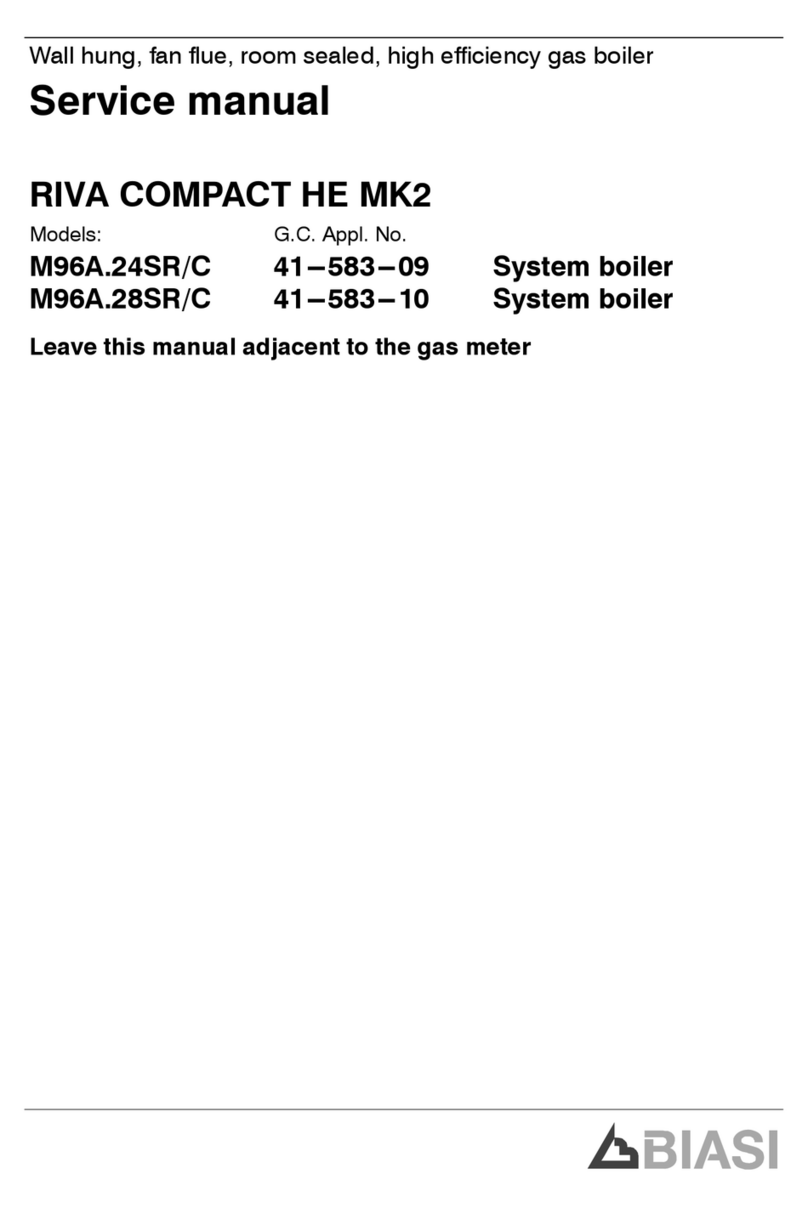
Biasi
Biasi RIVA COMPACT HE MK2 M96A.24SR/C Service manual

ECR
ECR Olsen OQ95M-200 Installation, operation & maintenance manual

Worcester
Worcester GB162-50 Installation and servicing instructions
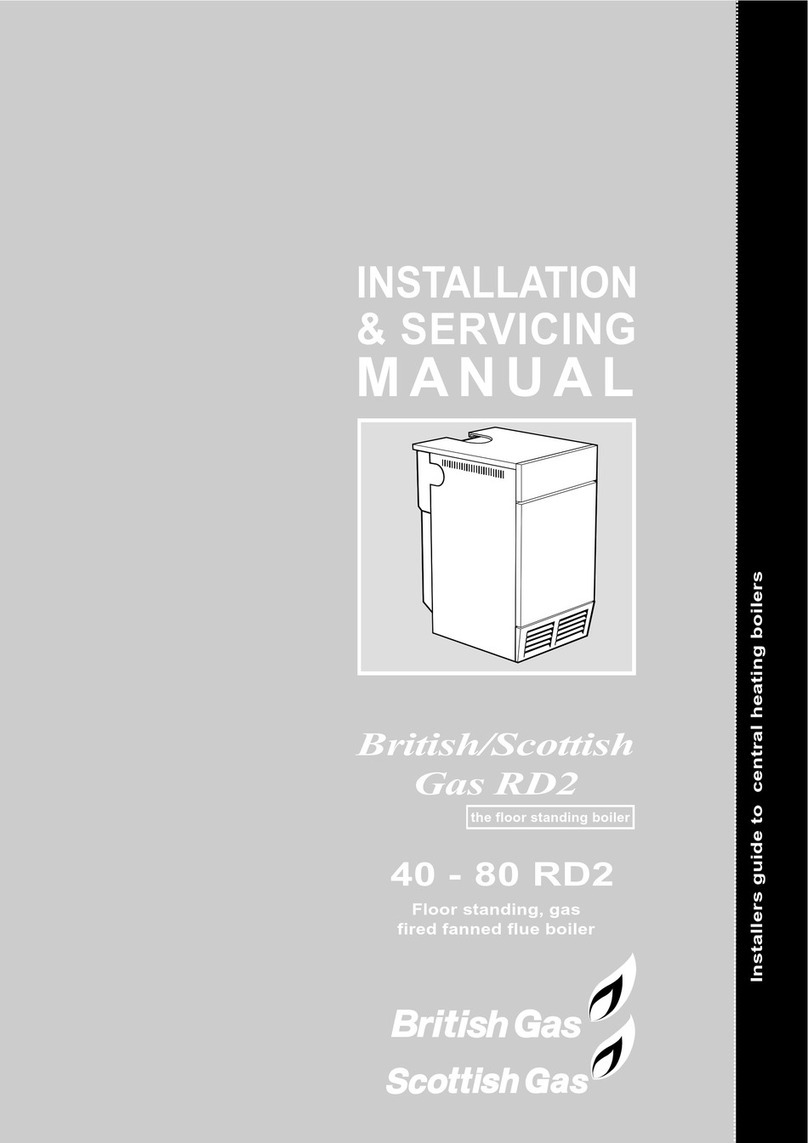
Ideal Boilers
Ideal Boilers British Gas RD2 Installation & servicing manual
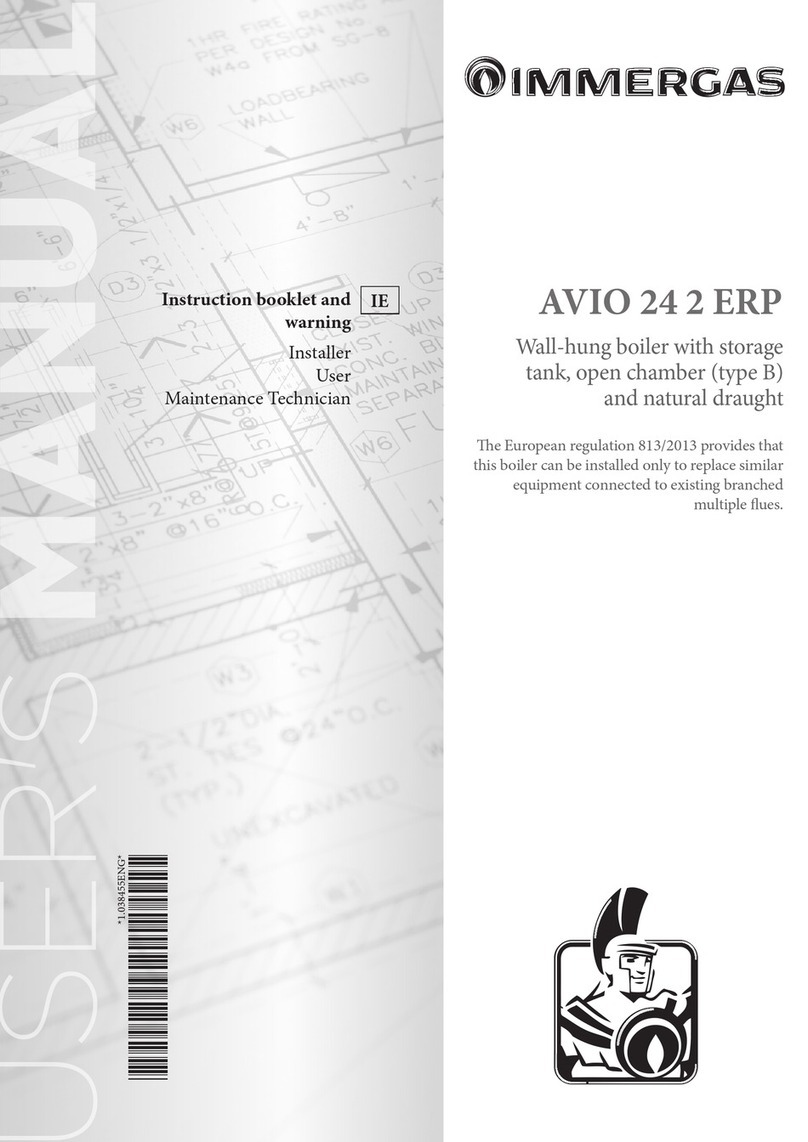
Immergas
Immergas AVIO 24 2 ERP Instruction booklet and warning
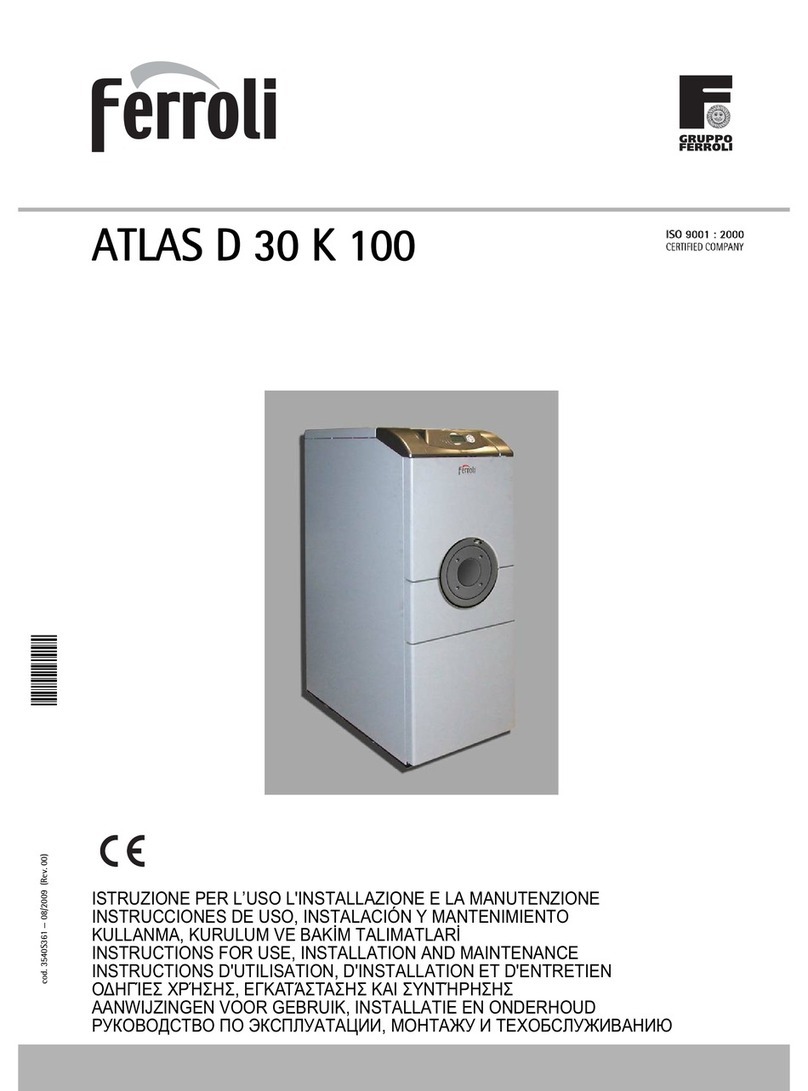
Ferroli
Ferroli ATLAS D 30 K 100 Instructions for use, installation and maintenance

